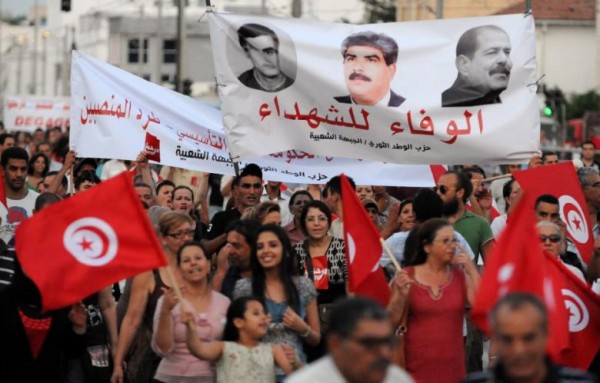
AFP – Salah Habibi
In a week freighted with heavy symbolism, Tunisians tried to heal the scars of the tumultuous year marred by two assassinations, a suicide bombing in a resort town and routine incidents of violence, threats and political infighting.
Earlier this week, three people were arrested in Kairouan for alleged links to militants deemed responsible for assassinations of opposition politicians Chokri Belaid and Mohamed Brahmi last February and July respectively. The operation coincided with the date the Tunisian constitution went into force on February 10, only four days after the nation commemorated the one-year anniversary of Belaid’s murder.
The brazen killing of the vocal leftist politician last February set in motion Tunisia’s most profound political crisis since the uprising and marked a true turning point in the fraught transitional process. According to an NDI study released last year, Tunisians viewed Belaid’s death as the beginning of a potential trend of politically-motivated violence. As unsettling as the assassination was for Tunisia’s future, it also served as a significant catalyst for expediting the long-delayed transition and finalizing the constitution.
After months of philandering with Salafists, the interim government toughened up against extremists and banned last year’s Salafist congress slated for May. The same month, the government labelled Ansar al-Sharia as a terrorist organization. About 2,000 Salafists had been apprehended by last summer.
In an interview with Le Monde in January, Ennahda leader Rached Ghannouchi conceded that his Islamist party could have been “firmer” with Salafists “from the very beginning.”
“Our experience in power is very recent. We’re learning each day,” Ghannouchi said. “At the beginning, these extremists did not practice violence, so we tried to discuss and ensure that they fall within a legal framework, as was the case with two Salafist parties.”
As the government moved from selective engagement with Salafists to a more hardline stance, the pressure mounted to end the interim phase and reinstate stability.
But efforts at restoring normalcy would be incomplete without justice. It is to put a symbolic closure to the deteriorating climate of violence that the interior minister announced last week the killing of Belaid’s alleged murderer, Kamel Gadhgadhi. Interior Minister Lotfi Ben Jeddou presented the news “as the best gift” to Tunisian people clamoring for justice and accountability.
On Sunday, a day after Tunisians paid homage to Belaid on the anniversary of his funeral, security services apprehended a suspect in Brahmi’s murder. Mohamed Brahmi was shot dead with the same gun that was used to kill Belaid on July 25, Tunisia’s Republic Day.
The symbolism of dates runs high in a country that went through immense soul-searching after the revolution. Constituent Assembly members promised to finish the constitution by the three-year anniversary of Ben Ali’s ouster to honor the spirit of the revolution but fell 12 days behind. Brahmi’s murder on the national holiday was largely perceived as an assault against the nation, while the killing of six national guards on two-year anniversary of Tunisia’s historic Constituent Assembly vote (October 23) dealt a major blow to the legitimacy of the elected body. Meanwhile, the killing of Belaid’s alleged assassin on the anniversary of his death was presented as restoration of justice.
As Tunisia keeps navigating through the turbulent waters of transition, the key to its success lies in striking the right balance. The spirit of consensus marked the completion of the long-awaited constitution, a product of compromise between the country’s jousting sides. Now reflecting on the year of acute instability, the interim government needs to craft the same balance in restoring state authority without falling into the trap of repression and authoritarianism.